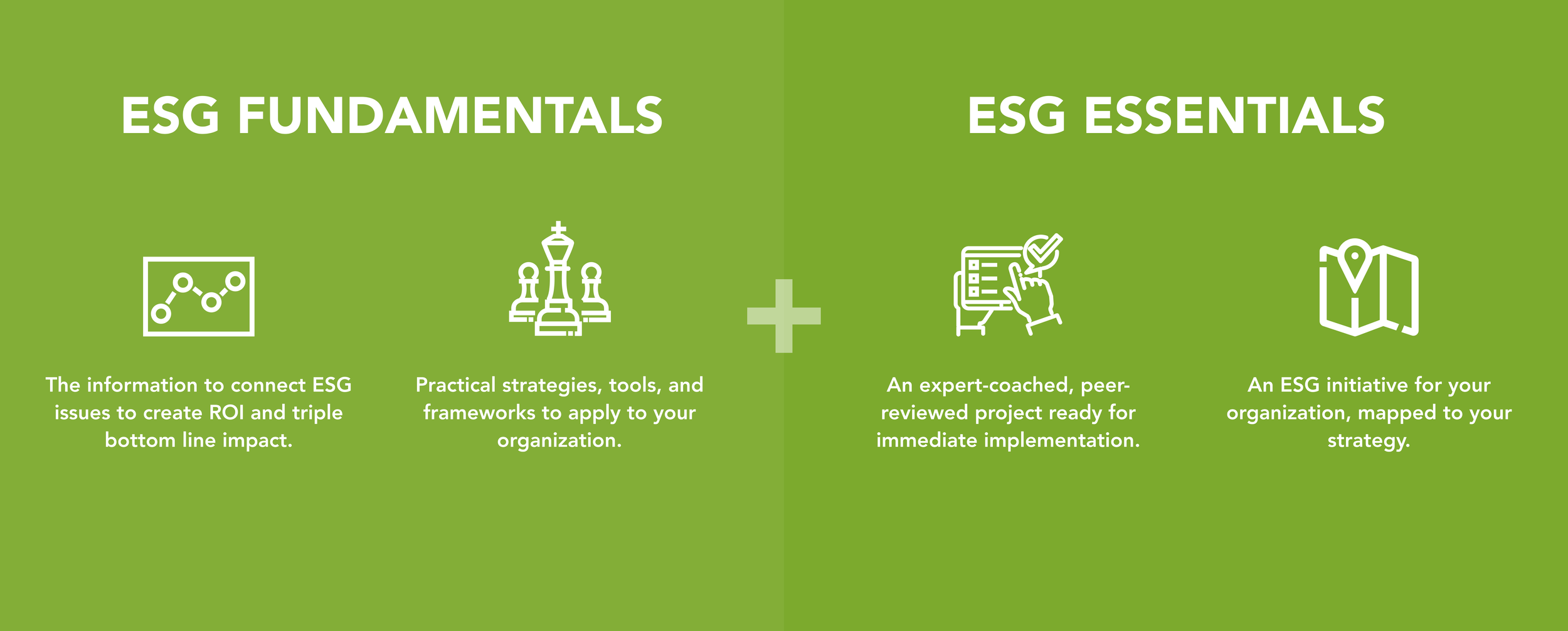
ESG Fundamentals & ESG Essentials
Registration is now closed for this program, which started November 27, 2023.
For more information regarding bringing these programs to your organization, request more information (below) or schedule a quick call.
Scroll further down to see options.
The demand for businesses to address Environmental, Social, and Governance (ESG) issues is growing—from investors, customers, employees—and beyond. No longer can these be relegated to the ‘sidelines.’
That requires leaders and professionals to connect the most important, or ‘material,’ ESG issues with a return on investment for the company and sustainable impact across the triple bottom line—and take action. Interested in learning more about what ESG is all about? In a nutshell, it is the Environmental, Social, and Governance issues that have an impact on a company’s performance and its stakeholders.
ESG Fundamentals:
9 hours of total effort
Want to learn the fundamentals—not the rhetoric—of ESG?
We have developed 4 online learning modules to provide leaders and professionals a fast and effective way to increase their ability to generate value—financial value—by learning how to address and integrate the most important environmental, social, and governance (ESG) issues into the areas for which they already have experience and responsibility.
-
In this module we cover the basics of finance and lay a solid business foundation for the course. In future modules we’ll build on this foundation as we introduce you to frameworks for integrating sustainability with your business strategy. This module includes:
Lesson 1: Financial Basics
Lesson 2: Creating Shareholder Value
Lesson 3: Strategy-Driven Value Creation
-
The goal for this module is to provide everyone in our course with a common foundation for understanding what it means to create environmental, social, and economic value—also known as the triple bottom line. We cover several frameworks for assessing the business impact on environmental and social systems. We then define ESG and its impact on business and investing. This module includes:
Lesson 1: Sustainable Business and the Triple Bottom Line
Lesson 2: The Systems View of Business Impact
Lesson 3: Sustainable Investing, ESG, and its Impact
-
In this module, we merge two objectives—shareholder value creation (Module 1) and triple bottom line impact (Module 2)—to show how sustainability can be integrated with business. We’ll ‘connect the dots’ by using the Sustainable Value Creation Map (SVCM) to show how ESG initiatives link to the various layers of the business strategy. Lessons in this module:
Lesson 1: Identifying and Prioritizing Material ESG Issues
Lesson 2: Mapping Cause-and-Effect from ESG Initiative to Impact and Value
Lesson 3: The Value of a Sustainability-Driven Strategy
-
Companies are accountable to their stakeholders and investors, so they must also set targets and make public commitments, and then measure and disclose their progress towards achieving them. We start this module by studying the Corporate Action Cycle, which lays the foundation for the rest of the module where we’ll cover sustainability reporting, setting goals, and creating metrics. This module includes:
Lesson 1: Introducing Sustainability Reporting and Frameworks
Lesson 2: Reporting Sustainability to Investors
Lesson 3: Setting Goals and Measuring Progress
If you are interested in making these learning modules available to people in your organization, please contact us.
“There are two important things that I’ve learned (so far). The financial basics — it is the first time I have been exposed to this content in this way. I think it is important knowledge to have and will definitely be useful throughout my career. And seeing ESG integration as more than a risk avoidance strategy for a firm. ESG can also be a value-creation opportunity through the four basic drivers of value creation (increasing revenue, reducing expenses, optimizing capital, and/or reducing risk).”
– WholeWorks Program Participant
ESG Essentials:
24 hours of total effort
Want to learn the essentials of ESG and apply them to a project in your organization with expert coaching and peer support?
With the ESG Essentials program, you get the same 4 modules in the Fundamentals program (see above) plus a 5th module that focuses on applying the principles to your organization. You will develop a project charter with expert coaching and peer review.
A key component of this program is the hands-on experience of developing a ‘Sustainable Value Creation Map,’ for your organization, using WholeWorks’ novel mapping application. This enables you to ‘connect the dots’ between a material ESG issue (or opportunity), financial value for your firm, and a positive impact across the triple bottom line, environmentally, socially, and economically.
Complete the program in approximately 24 hours over 6 weeks and walk away with a solid business case for an important ESG initiative, as well as the essential elements identified to make it work in your organization.
If you are interested in bringing this learning experience—or a customized learning experience based on these principles—to your organization, please contact us.
"The most important thing I have learned this week is how to make cause-and-effect connections and how different ESG initiatives can strengthen a company’s strategy and achieve a positive triple bottom line impact using the SVCM. I was able to apply what we have learned throughout the course so far to demonstrate how an ESG initiative can create sustainable value (both short-term and long-term)."
– WholeWorks Program Participant

What You Will Gain In:

Our Alumni are the Proof
Join the 350+ professionals and leaders from 35 countries around the world who have experienced WholeWorks programs.
They come from companies of all sizes—from sole entrepreneurs to Fortune 50 companies—and everything in between. That’s because integrating sustainability into enterprise is not only the responsibility of a few select professionals, but the necessary work of a broad array of business functions:
• Operations & logistics
• Research & development
• Product development
• IT, finance, & HR, among others.
• Marketing & sales
• Business development
• Consulting
• Sourcing & supply chain
• Manufacturing
More than two-thirds of our alumni have 10 or more years of professional experience in their areas of expertise and 25% have more than 20 years. All of them are committed to making their work, companies, industries, and communities more sustainable. We design our courses for a global audience: 40% of our alumni speak English as a second language, and we are proud of the 95% success rate they have—that’s the percentage of participants who start and finish our courses. There is no sustainable world without sustainable business.
Join us!







